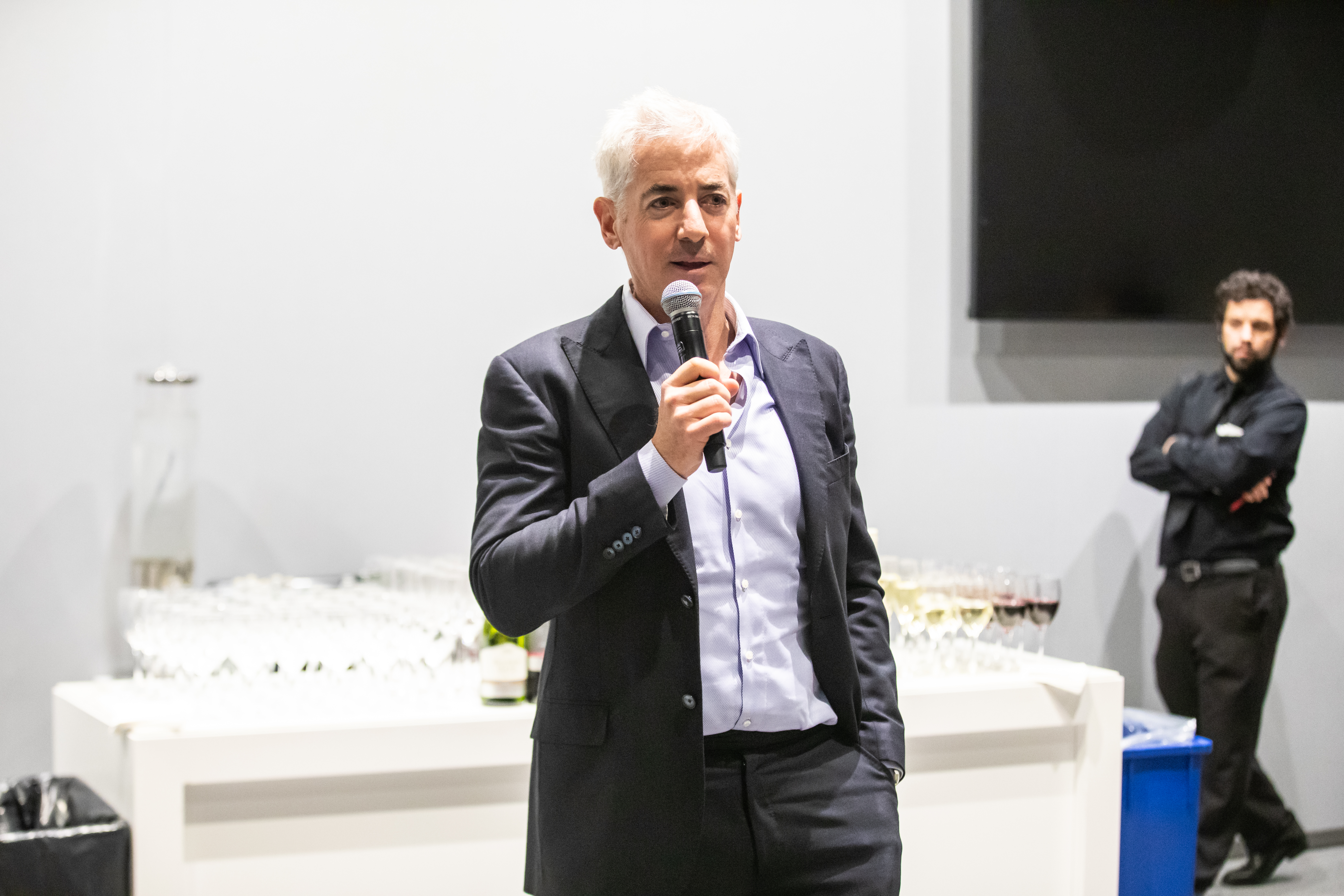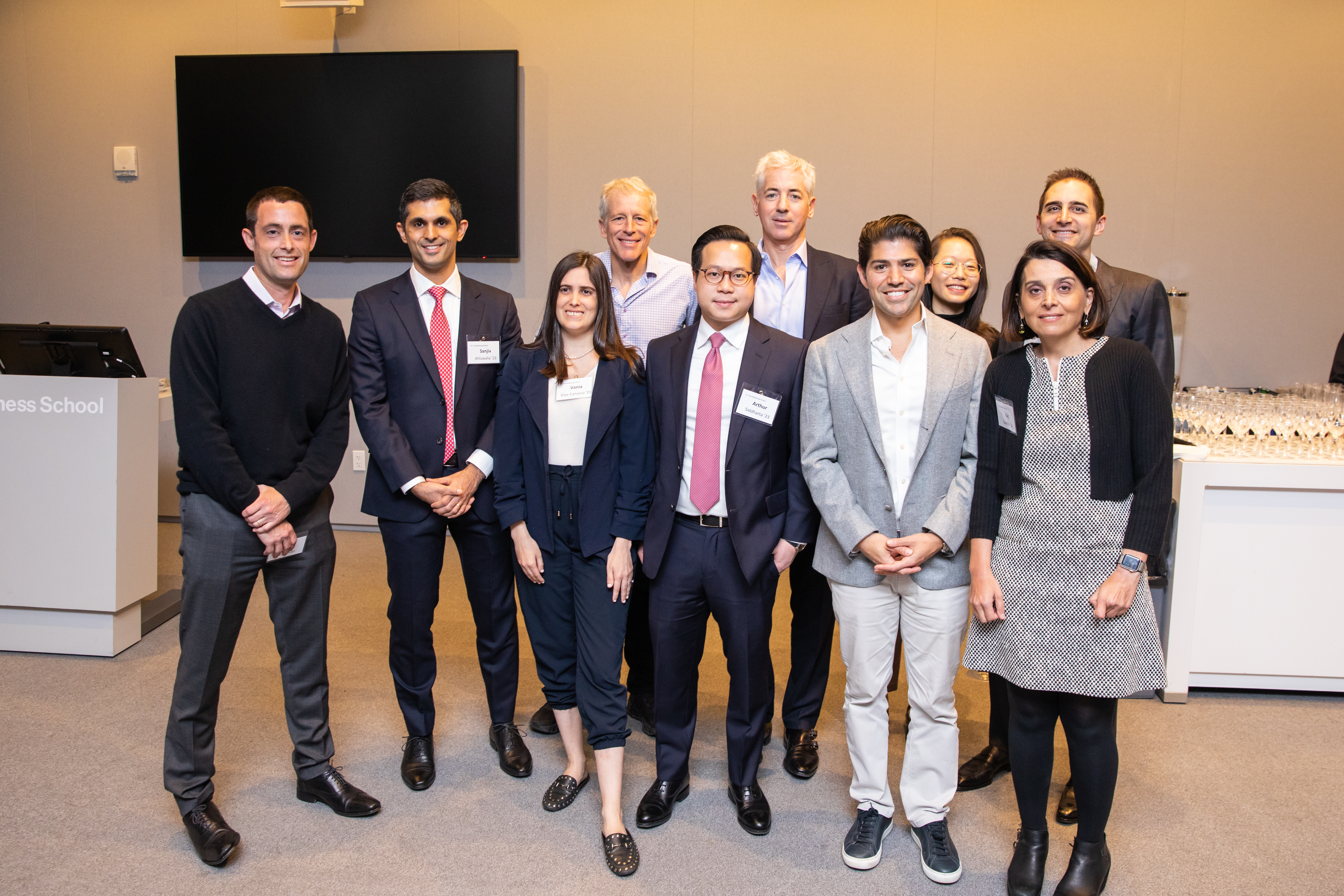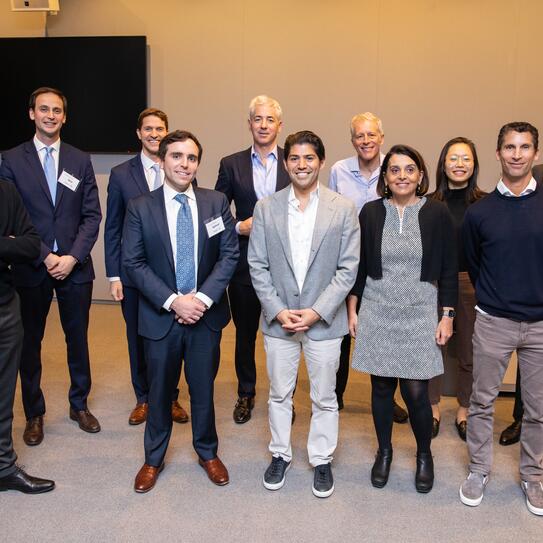More than a dozen students recently showcased just how well the Columbia Business School's curriculum blends theoretical and practical investing skills. Five teams of students pitched their investment ideas before a panel of judges, competing for the $100,000 first-place prize and $50,000 second-place prize, funded by legendary hedge fund investor Bill Ackman.
This year marked the 16th Annual Pershing Square Value Investing and Philanthropy Challenge, which is the culmination of the School's Applied Security Analysis course. The integration of the course and competition is just one example of how the School leverages its prime location in the financial capital of the world, partnering with successful industry professionals to ensure students learn real-world investing skills during their time at CBS.
“I am not a Columbia Business School graduate, but I have a lot of admiration for the School and the Value Investing Program,” Ackman, founder and CEO of Pershing Square Capital Management, told the crowd of students watching the challenge in the School's new Geffen Hall glass tower. “There is a lot of good history in the program.”
Developing Analytical Skills
Drawing on CBS's value investing strengths, the Applied Security Analysis course thoroughly grounds students in the nuts and bolts of evaluating a company. Each session examines a business from a different angle, from valuation and historical track record to management teams, business model quality, industry trends, and corporate culture and incentives. On top of building their quantitative financial modeling and valuation skills, students in the class learn how to conduct a qualitative analysis.
“I think Applied Security Analysis is one of the best classes globally for students from all different backgrounds to gain exposure to real-world applied investing,” says Evan Zehnal '17, an equity research analyst at Fidelity Investments Canada. “Those who take the class come away with an arsenal of real-world investing skills.” Zehnal as well as Ben Isaac '14, chief investment officer at Brizo Capital, and Lauren Harmon '16, research analyst at Polen Capital, all took the course as students and returned to campus to teach this year's crop of enrollees.
Each week features a guest speaker. In addition to Ackman, speakers included Kim Shannon, founder of Sionna Investment Managers, one of the largest independent investment firms led by a woman. Also lecturing were podcast hosts Ben Gilbert and David Rosenthal, who, in their podcast Acquired, discuss the stories of successful companies and what others can learn from them.
Prepping for the Competition
In the weeks leading up to the competition, students work in teams to select an investment idea, conduct primary research, and hone a pitch to sell their idea. The process replicates the on-the-job experience of an analyst recommending a company to a portfolio manager.
“We really emphasize the concept of a variant view,” says Isaac. “What do you believe and have evidence for that the market does not believe or does not have evidence for?” He adds, “I feel strongly that there really is no substitute for primary research. It is so important to developing an independent view.”
To conduct their research, the students practice many techniques not easily taught through textbooks, such as field reporting and convincing industry experts to speak to them. “This class is very similar to what I ended up doing in my first role out of school,” says Zehnal. “A lot of the diligence and thesis skills I developed in class really helped me hit the ground running when I got to a fund.”
As anyone in sales can attest, how information is presented can be as important as the information itself. Students practice pitching their ideas to professors and other investment professionals, who provide feedback in real time. For guidance, all teams are paired with an industry mentor as well as an investment firm.
It's an experience that can give students a leg up when it comes to job interviews, something Isaac noticed as a student when he shared his research and presentation with recruiters. “A good pitch not only shows what you are capable of, but it allows you to demonstrate the way you think about investments, not just as an abstraction but with a really meaty understanding,” he says.

The Big Event
Speaking at this year's competition, Ackman expressed his admiration for the preparation CBS and the Applied Security Analysis class in particular provide the students: “There was nothing like this when I got into this business, so I had to learn on my own. You have a big advantage.”
Of course, another advantage the students enjoy is the active involvement of Ackman, who doesn't merely lend his firm's name to the event. “Bill is absolutely indispensable to the process,” says Isaac. Both Ackman and Pershing Square's chief investment officer, Ryan Israel, were guest lecturers this year. Together their team combed through the 19 pitches and selected the five finalists. They also assembled the panel of judges who chose the winning team.
The judges evaluated the finalists on the quality of the idea and research, as well as the delivery of the presentation. “The questions the judges ask are representative of what an investment committee would be like with successful, high-powered investors,” says Isaac. “There aren't a lot of softballs.”
This year, the five finalist teams pitched companies ranging from household names to lesser known niche players, arguing why each was currently undervalued. For Airbnb, for example, the team's research suggested that, contrary to prevailing opinion, the number of hosts will continue to increase, as the market is vastly underpenetrated. The four other featured companies included Planet Fitness, plumbing supplier Ferguson, car dealership group Lithia Motors, and professional employer organization Insperity.
This year's top prize went to the team that pitched Lithia Motors. But every team comes away from the challenge having gained impressive skills and experience. As in previous years, reports of the students' impressive pitches are rippling across the CBS network and garnering attention in wider investing circles.

Learning to Give Back
The challenge isn't only about personal success. Since investment management can be lucrative when done well, Ackman wanted the competition to include a charitable angle. Philanthropy is built into the very name of the challenge, and the winning teams typically donate a percentage of their prize. These donations most often benefit the School, with teams giving to scholarships at CBS or the Heilbrunn Center. Some prize winners have supported additional causes, such as health care researchers working on Alzheimer's and Crohn's disease.
Ackman notes that philanthropy isn't an inherited talent and can be much more complicated than investing. “Your net present value applies to some extent,” he says, “but when you are trying to solve societal problems, how do you quantify the benefit? Or make sure your support is being given in a way that is efficient? How do you back a nonprofit and make sure it's being run efficiently? You don't have all the information you would at a public company.”
To drive home some of these lessons, Joel Greenblatt, a former professor and co-chief investment officer of Gotham Asset Management, guest lectured this year on how to give well. “Giving back and philanthropy is woven throughout the course,” says Polen Capital's Harmon.
Watch a video of the event here:
